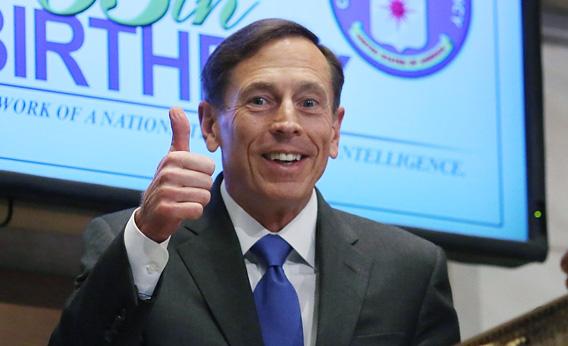Act II: The Antifragile Adulterers
General Petraeus has just entered a plea deal to avoid prosecution by the Department of Justice. The extent of his crimes are shocking:
Not only did Petraeus give Broadwell access to extraordinarily sensitive and classified information—including notebooks containing information on world leaders, intelligence informants, and military operations–but then he lied to the FBI about having done so, and then failed to return critical documents upon resigning despite (likely because of) the ongoing investigation. This adds two new crimes to the aforementioned abuses. And again, these are just the violations that he has admitted to in the plea—part of the intent of which is to preclude a deeper investigation that would likely unearth further crimes.
In light of the fates of whistleblowers like Manning, Snowden, Kiriakou and Sterling, and the banal motivations behind Petraeus’ actions—one would not be faulted for assuming that he will face dire consequences for his infractions. But instead, Petraeus was given probation and fined a grand total of $40,000 (keep in mind, he now has a seven-figure annual income). That’s it.
But it gets better (or worse):
Broadwell faces absolutely no punishment for soliciting, possessing, or publically disclosing this material (all of which are crimes). Instead, she has made a small fortune off of her biography of Petraeus, in no small part because of the scandal. She now serves as a “leadership consultant” for a number of firms—recently profiling U.S. Secretary to the U.N. Samantha Powers for Prospect Magazine.
Another senior military leader caught up in the scandal was Gen. John Allen. With regards to counterinsurgency, he was an integral part of Petraeus’ inner circle; it turns out he was also a node in the love triangle that brought Petraeus down (Allen was found to be conducting an [online?] affair with Jill Kelley, Broadwell’s perceived rival for Petraeus’ extramarital affections).
As he was drawn deeper into the public morass, Allen retracted his nomination to become NATO’s next Supreme Allied Commander, instead accepting an early retirement from the military. Like Petraeus, he was allowed to keep his cushy pension despite the clear breech of the military code.
In fact, Allen is also getting a second wind, appointed by the Obama Administration to spearhead coalition efforts in the anti-ISIS campaign. Even Petraeus himself, despite his admitted misuse of classified information, continues to act as consultant for the National Security Council (NSC). Again, given that it was largely the policies of this military cabal which helped ISIS flourish in the first place, it is no wonder that the current strategy to combat them is failing (or perhaps better said, backfiring).
In short, the only ones who have to face any consequences in this whole sleazy ordeal are those who had the misfortune of executing Petraeus’ disastrous plans (often paying a high price to realize his vision with little to show for it), or else those in the affected countries who continue to live in the aftermath of catastrophes which these actors continue to compound.
In defending Petraeus against the FBI investigation, Senator McCain declared that “the American people cannot afford to have this voice silenced or curtailed” by the scandal. It may be more apt to say that the world cannot afford him public platforms to perpetuate further unwinnable wars. This is the greatest tragedy: not the horrors these people have already visited upon the world without consequence, but the high-likelihood that they will continue to do so—perhaps even on a grander scale—despite (and in some ways because of) the scandals.

